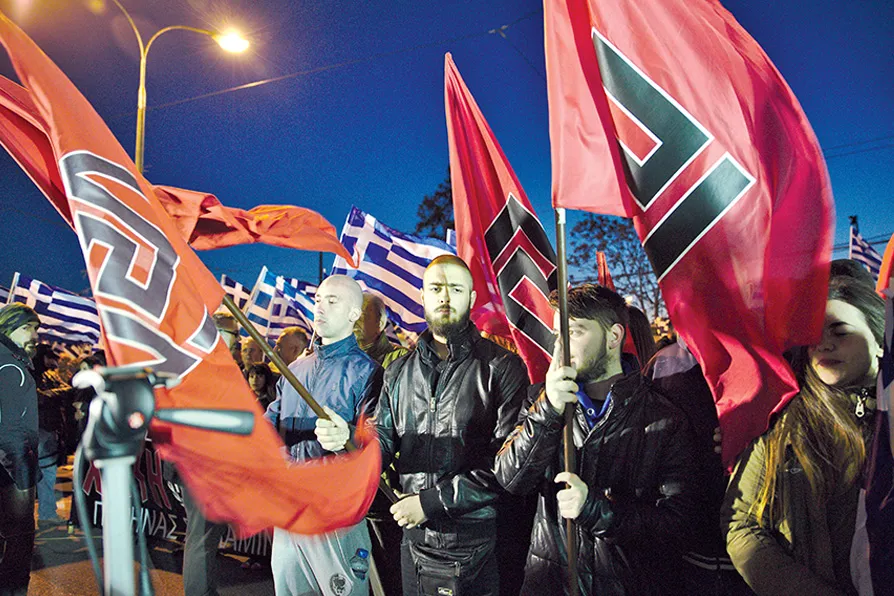DENNIS BROE searches the literary canon to explore why a duplicitous, lying, cheating, conning US businessman is accepted as Scammer-in-Chief
These are vivid accounts of people’s experiences of far-right violence along with documentation of popular resistance, says MARJORIE MAYO

 Golden Dawn members hold flags with the meander symbol at a rally outside of party HQ, Athens, March 2015 [Pic: DTRocks]
Golden Dawn members hold flags with the meander symbol at a rally outside of party HQ, Athens, March 2015 [Pic: DTRocks]
You Can Kill Each Other After I Leave: Refugees, Fascism and Bloodshed in Greece
Patrick Strickland, Melville House, £25
THIS is a deeply disturbing book about the far right and its manipulation of xenophobia, challenges that are all too prevalent in the contemporary context.
Greece has a long history of far-right violence, dating back to the Nazi occupation and the civil war that followed. While recognising the significance of these roots, though, this book focuses on more recent times, in the 21st century.
The author came to Greece as a journalist in 2015, when the country was still devastated by the effects of austerity policies, triggered by the economic crisis of 2008. This economic chaos gave many opportunities for the far-right “Golden Dawn” party to exploit, already, even before his arrival.
And then there was the “European refugee crisis” as people sought refuge from horrific violence at home, with the Greek islands of Lesbos and Chios among their first staging posts on their way towards western Europe.
When Patrick Strickland first arrived, he was only too aware of the anti-refugee xenophobia and racism that remained rampant in Greece, as elsewhere.
He describes his book as a series of dispatches about the human impact of displacement, borders and fascism, a record of racist violence that the world shouldn’t be permitted to forget. But this was only one side of the story. He was also writing a love letter to the people fighting the rise of fascism.
You Can Kill Each Other After I Leave recounts the stories of those who resisted far-right violence as well as the stories of the perpetrators. The book’s strength comes from these personal accounts, from refugees and asylum-seekers from Afghanistan, Gaza, Iraq, Syria and elsewhere. Strickland enables them to tell their stories in their own words. And he bears witness to the deteriorating conditions in the camps to which they became confined, as government (including Syriza/Leftist government) policies hardened towards them, as the numbers grew.
There are extremely distressing accounts of violence perpetrated by Golden Dawn activists and their supporters, including accounts of brutality that the author himself witnessed.
Reporting instances of far-right violence was very dangerous, though. Journalists, especially photojournalists, were frequently beaten up and their equipment smashed. And Golden Dawn thugs were generally able to behave with impunity.
All too often, the police were simply looking on, if not actively supporting the perpetrators, and even providing them with weapons. State collusion with the far right was a chilling, horrific forerunner of state collusion in other contexts, including Gaza and the West Bank, more recently.
Although much of the book’s focus is on refugees and asylum-seekers, Strickland also recounts the stories of economic migrants, such as the Pakistanis who had come to mainland Greece in search of better livelihoods in the previous decade, only to encounter appalling exploitation and repression.
As in the islands, at first, there had been Greeks who had provided support to the newcomers. Strickland describes the anarchist squats that developed in Athens and elsewhere as centres of resistance and solidarity.
But as time went on resistance became increasingly problematic. Strickland is very critical of politicians from the left as well as the right, for their failures to intervene, let alone to develop humane policies in response.
Eventually Golden Dawn activists were put on trial. In 2020 the outfit was declared a criminal organisation and party leaders were subsequently sentenced to 13 years in prison. While this was a cause for celebration, this was not the end of anti-migrant violence.
As the author also points out, in 2023, Greeks headed to the ballot box to cast their votes in the second round of that year’s general election. The rightist party, New Democracy, gained more than four out of 10 Greeks, with more than half voting for anti-migrant parties overall.
Strickland concludes the book on a sober note. Violence continues, along with the prevalence of fascist conspiracy theories. But there are also grounds for hope. “We work together, we live together,” anti-fascists chanted on a demonstration that he witnessed when he returned to Greece in 2024. “Locals and migrants, smash the fascists.”
This book isn’t always easy to follow. The narrative shifts from place to place, following different stories over time. Nor is this a deeply analytical account, let alone a Marxist-Leninist account.
The author clearly recognises the significance of some of the key underlying factors, including Greece’s economic plight in the wake of the crisis of 2008. Other factors also gain a mention, with references to the potential interests of the US in the region, during the dispute with what is now called Northern Macedonia. The name was extremely controversial with Greek nationalists, including the far right, claiming that “Macedonia” could only be used to refer to the north-west of Greece.
But such wider issues are not fully explored.
Rather, the book’s strengths lie in the vivid accounts of people’s experiences of far-right violence along with the author’s accounts of popular resistance, and humanity. The wider implications are only too relevant.

MARJORIE MAYO welcomes an account of family life after Oscar Wilde, a cathartic exercise, written by his grandson

RON JACOBS welcomes a book that tells the story of the far right in Greece from the perspective of migrants











